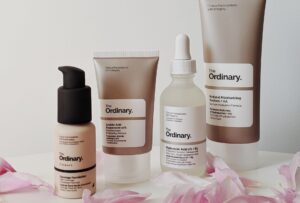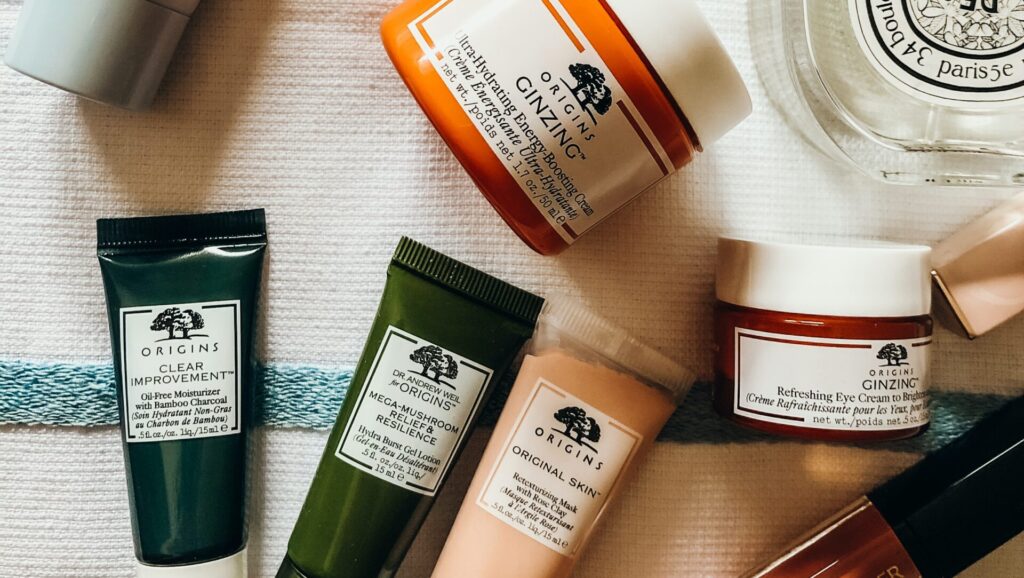Megan Levick
Discovering the world of skincare has felt like joining a club I can’t imagine not being part of. My skincare routine has become an essential component of my daily life.
But don’t just take it from me. Skincare isn’t just a cosmetic necessity, and an effective skincare routine can influence your mental and physical wellbeing significantly. Your skin is your body’s largest organ, so it is crucial that you are taking the correct steps to care for it.
Skincare for stress reduction
Research shows that those who suffer from conditions such as acne, eczema, rosacea or psoriasis can often struggle with poor self-image and low self-esteem, which can affect the way that they perceive themselves, and even their interpersonal relationships.
A skincare routine can help to tackle the challenges that people with problem skin may face by using targeted products to enhance their overall skin health and improve specific skin concerns. InStyle‘s State of Skin study found that 76 per cent of participants said they felt good about themselves if they thought their skin looked good, regardless of age.
A skincare routine has also been shown to effectively control stress levels. Committing to a consistent routine can impact your emotional wellbeing by both adding structure to your day and ending it with a positive ritual. This can be beneficial in times of unpredictability and uncertainty and can help reduce stress levels by adding some rhythm and stability to your otherwise hectic day-to-day. The results of a recent study found that implementing a regular three-step skincare routine reduced levels of the stress hormone cortisol by around 83 per cent.
But routine does more for your mental wellbeing than just stress reduction.

The relationship between skincare and mental health
It goes without saying that a skincare routine has a multitude of physical benefits, including skin sebum control, reduced dryness and a clearer complexion. But you might not be aware of the deeper relationship between skincare and mental health.
Your skin acts like a window to your inner-self. “You can tell a lot about somebody by looking at their skin,” says dermatologist Bruce Brod, including how much sleep you’re getting, whether you smoke or not, or how much water you’re drinking.
This means that the appearance of your skin can also reflect the habits that form when you are feeling depleted or struggling with your mental health. Feelings of stress or anxiety can manifest in the form of breakouts or other dermatological problems, too.
I've finally come to terms with the fact that while having a regular skincare routine is great (especially for my mental health) I should not be chasing the perfect glass skin standards espoused by influencers online..like there's so much filter & photoshop involved everywhere!
— ⚰️ (@apparitionnow) June 11, 2023
If you’re experiencing poor mental health or just feeling generally overwhelmed, seemingly uncomplicated tasks like basic hygiene can feel like a chore. Small and consistent acts of self-care, such as taking the time to do a face mask, can be the catalyst to improve your overall wellbeing, boosting your confidence and stimulating the natural release of feel-good neurotransmitters, such as dopamine and serotonin.
“Your skincare regimen can become a meditative practice”
People who suffer from anxiety may find that their symptoms are exacerbated at night-time, without the distractions and occupations we are faced with during the day. Taking time before bed to partake in your skin-care routine can provide an opportunity for mindfulness, allowing a window for you to reflect on how you’re feeling in the moment, and re-examine any negative thoughts from a fresh perspective.
Upon doing this, your skincare regimen can become a meditative practice. Repeating this routine on a regular basis can form positive patterns of behaviour, creating feelings of stability and encouraging a more peaceful mindset.
How much should I invest in my skincare?
Time
I take around half an hour in the morning and in the evening to complete my AM and PM skincare routines, although this can vary depending on how extensive your routine is.
I like to take it slow and enjoy every moment of my routine; this helps to reap all the mindful benefits. If you’re busy, your skincare routine can be squeezed into a ten-minute session, or, you could even stretch it out to an hour.
Cost
It’s important to remember that high cost doesn’t always equate to high quality, and a lot of budget-friendly products can still deliver. There might be a particular product that you would like to splurge on, but many popular and effective products cost anywhere between £5 and £20.
https://www.tiktok.com/@katiehub.org/video/7183870925564038446
Skincare tips from a skincare junkie
The world of skincare is vast. With so many different products out there to choose from, it can feel daunting. As a self-confessed skincare addict, here are my top tips for demystifying skincare and refining your routine.
Less is more
Depending on your specific skin concern, a 10-step routine is not always required for your skin type, and could actually be aggravating any dermatological problems by clogging your pores with unnecessary product. Sometimes, simplicity is key, and overdoing it can cause additional skin issues such as congestion and breakouts. Stick to the basics and use only what your skin needs.
Double cleansing
Double cleansing ensures that your skin is sufficiently clean so that the rest of your products can work to their full advantage. Your initial cleanse should dissolve your makeup and break down dirt and oils, whilst the second cleanse should hydrate your skin and rid it of any additional impurities that may be left behind.
Exfoliate
A good physical or chemical exfoliator is essential if you want to achieve glowing skin. Exfoliation has a multitude of benefits, including improved skin texture, preventing breakouts, and removing dead skin cells. However, over-exfoliating can cause damage to your skin barrier, so I personally stick to 2-3 days a week, depending on how my skin feels.
Invest in a good SPF
A good SPF is a skincare staple for any routine. It helps to prevent damage from excessive sun exposure, which can lead to a variety of skin issues, including hyperpigmentation, wrinkles, premature skin ageing, and even cancer.
READ NEXT:
-
9 SELF-CARE STRATEGIES THAT WILL PUT YOU ON TOP OF THE WORLD
-
‘CYBERCHONDRIA’: TIKTOK AND MENTAL HEALTH SELF-DIAGNOSIS
-
SKINTALK: SUMMER SKINCARE ESSENTIALS
Featured image courtesy of michela ampolo via Unsplash. No changes have been made to this image. Image license found here.

